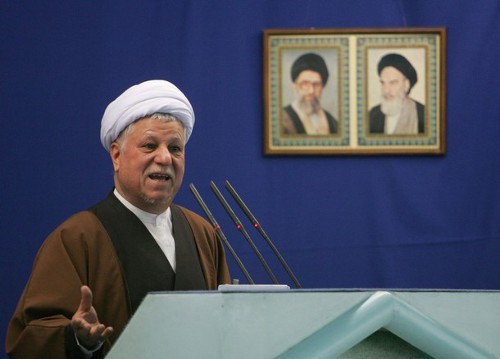
Geneive Abdo reports in Foreign Policy that Akbar Hashemi Rafsanjani’s fence-sitting days are over; he is officially an ally of Ayatollah Ali Khamenei:
In exchange for Rafsanjani’s loyalty, the supreme leader appears to have given him power over a new bill that will establish a National Elections Commission to reform the electoral process. Not only is this issue at the heart of Iran’s political crisis, but the commission would also determine the eligibility of individuals to stand as candidates in elections. And the Expediency Council, which monitors legislation and is responsible for any conflicts that might result over Iranian laws, will also decide the members who serve on the National Elections Commission.
This significant change in the elections process will greatly reduce the power of the Guardian Council, a body of six hard-line clerics and six jurists appointed by Khamenei. Historically, this Guardian Council has banned many reformist candidates from running in elections, thus ensuring conservative control even in the face of growing public discontent. The guardians were also charged with hearing complaints about election fraud and complaints from banned candidates contesting their exclusion. Now, the National Elections Commission will hold some of these responsibilities.
By bringing Rafsanjani back into the fold, Khamenei appears to be trying to reduce the power of the hard-liners, including some of those who sit on the Guardian Council. It is true that reforming Iran’s electoral process is one step toward a less totalitarian regime. However, it is unlikely to pacify the millions of Iranians who consider themselves part of the opposition. If Khamenei had made this decision soon after the June election, its effects would have, perhaps, been different. But now, many in the opposition have far greater demands, including Ahmadinejad’s resignation.
The question now arises: How will these political shifts affect the success of the Green Movement? Will Rasfanjani’s actions serve to deflate or energize the opposition? Only time will tell.
Are you a dedicated reader of FDD's Long War Journal? Has our research benefitted you or your team over the years? Support our independent reporting and analysis today by considering a one-time or monthly donation. Thanks for reading! You can make a tax-deductible donation here.








2 Comments
This seems more of a long term, down-the-line solution, which is good. However, being as farsighted as it is, it addresses nothing of the present, which is bad.
In other words, its mildly in favor of the Green Revolution, because the only thing Khamanei got out of it was one less major voice talking him down. Khamanaei got power.
Mr. Rafsanjani is a very wealthy career conservative politician. The ‘ruthless’ years during his Iranian presidency, from 1989 to 1997, helped cause a reformist backlash which led to the election of Mr. M. Khatami as president. Mr. Rafsanjani is continuing his power play. He is true to an internally conservative Iran. However, his ‘international cooperation’ stance is in contrast to the current government policies. Enjoy blogging while Mr. Rafsanjani and his ‘rotation buddy’ El Supremo Lider continue to get richer and richer.